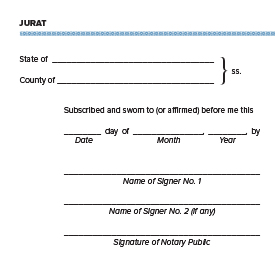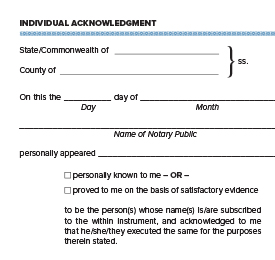Jurat
- Home
- Services
- Other Legal SERVICES
- Jurat
Jurat
The two most common notarizations requested are Acknowledgments and Jurats; but not everyone knows the difference between these two acts.
What Is A Jurat?
1. The signer must appear in person before you and sign the document in your presence.
2. In some states, you are required to positively identify the signer.
3. You must administer a spoken oath or an affirmation, and the signer must respond out loud. Silent answers such as a nod of the head are not acceptable.
While not required by law, it is strongly recommended that you have the signer raise his or her right hand to emphasize the seriousness of the oath or affirmation.
A jurat cannot be executed by someone offering to take the oath in someone else’s name — the original signer must swear or affirm the oath in person before the Notary.
Acknowledgment And Jurat Certificates
Because acknowledgments and jurats are different notarizations with different purposes, each requires its own certificate wording. You cannot use a jurat certificate for an acknowledgment, or vice versa. Make sure you use certificate wording that is acceptable under your own state’s rules.
In general, an acknowledgment certificate will contain the words, “acknowledged before me” or similar wording. Jurat certificates will contain the words, “subscribed and sworn to (or affirmed) before me.”
A jurat requires the following steps:
1. The signer must appear in person before you and sign the document in your presence.
2. In some states, you are required to positively identify the signer.
3. You must administer a spoken oath or an affirmation, and the signer must respond out loud. Silent answers such as a nod of the head are not acceptable.
While not required by law, it is strongly recommended that you have the signer raise his or her right hand to emphasize the seriousness of the oath or affirmation.
A jurat cannot be executed by someone offering to take the oath in someone else’s name — the original signer must swear or affirm the oath in person before the Notary.
What Is An Acknowledgment?
The purpose of an acknowledgment is for a signer, whose identity has been verified, to declare to a Notary or notarial officer that he or she has willingly signed a document.
A jurat requires the following steps:
1. The signer must appear in person before you and sign the document in your presence.
2. In some states, you are required to positively identify the signer.
3. You must administer a spoken oath or an affirmation, and the signer must respond out loud. Silent answers such as a nod of the head are not acceptable.
While not required by law, it is strongly recommended that you have the signer raise his or her right hand to emphasize the seriousness of the oath or affirmation.
A jurat cannot be executed by someone offering to take the oath in someone else’s name — the original signer must swear or affirm the oath in person before the Notary.
The signer must be able to directly communicate with you that he or she willingly signed the document. Arizona is the exception to this rule. Arizona state law permits a signer to communicate with a Notary through a translator who is also present at the notarization.
RELATED SERVICES
FAQs
There are 2 service options available:
Notary and Fingerprinting.
Mobile services can facilitate better cost and time management for personal and business needs.
Use our online portal for ease of scheduling.
We provide screening options for: Brokers, Real Estate, FINRA, Employment, FBI Apostilles, Students, Professionals, etcetera.
A valid Photo ID (see our requirements page). However, some other forms of identification may be required, depending on the requesting agency.
Depending on the requesting agency, an FBI background check may screen your criminal history from a minimum of 10 years or the lifetime of the applicant.



